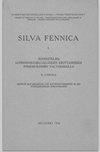Within-site adaptation: Growth and mortality of Norway spruce, Scots pine and Silver birch seedlings in different planting positions across a soil moisture gradient
IF 1.7
3区 农林科学
Q2 FORESTRY
引用次数: 0
Abstract
Adapting to site conditions is a central part of forest regeneration and can be done through selection of different planting positions. Requirements are tree species specific, and the use of soil moisture maps could be a way to support decision making in forest regeneration planning. At two experimental sites with varying soil moisture conditions in southern Sweden Norway spruce (Picea abies (L.) Karst.), Scots pine (Pinus sylvestris L.), and silver birch (Betula pendula Roth) seedlings were planted in four different planting positions following mounding site preparation; Depression, Hinge, Mound and Unscarified. Soil moisture estimates were obtained from a high-resolution depth-to-water raster for each planting spot. The effect of soil moisture, planting position and their interactions on mortality, height and diameter was evaluated for each tree species. In wet conditions mounds proved to be the best option to minimize seedling mortality for conifers, but with decreasing soil moisture, differences between the planting positions decreased. Birch on the other hand had the greatest survival in the hinge. The coniferous species displayed increased height and diameter when planted in mounds independent of the soil moisture conditions, whereas silver birch was less dependent on a specific planting position. Results from this study shows that a soil moisture map can explain mortality, height and diameter and thus can be a useful tool when choosing planting position in different soil moisture conditions.地点内适应:挪威云杉、苏格兰松和白桦幼苗在不同土壤湿度梯度下的生长和死亡率
适应场地条件是森林更新的核心部分,可以通过选择不同的种植位置来实现。要求是针对特定树种的,土壤湿度图的使用可能是支持森林更新规划决策的一种方式。在瑞典南部两个不同土壤湿度条件下的试验点,挪威云杉(Picea abies (L.))在立地准备后,将喀斯特、苏格兰松(Pinus sylvestris L.)和白桦(Betula pendula Roth)幼苗分别种植在4个不同的位置;洼地、铰链、丘和未被破坏的。土壤湿度估算来自于每个种植地点的高分辨率深度-水光栅。评价了土壤湿度、种植位置及其相互作用对各树种死亡率、树高和直径的影响。在潮湿条件下,土堆是降低针叶树幼苗死亡率的最佳选择,但随着土壤湿度的降低,不同种植位置之间的差异减小。另一方面,桦树在铰链处的存活率最高。在不依赖土壤湿度条件的土堆中种植时,针叶树种的高度和直径增加,而白桦对特定种植位置的依赖较小。研究结果表明,土壤湿度图可以解释死亡率、高度和直径,因此可以作为在不同土壤湿度条件下选择种植位置的有用工具。
本文章由计算机程序翻译,如有差异,请以英文原文为准。
求助全文
约1分钟内获得全文
求助全文
来源期刊

Silva Fennica
农林科学-林学
CiteScore
3.50
自引率
11.10%
发文量
21
审稿时长
3 months
期刊介绍:
Silva Fennica publishes significant new knowledge on forest sciences. The scope covers research on forestry and forest ecosystems. Silva Fennica aims to increase understanding on forest ecosystems, and sustainable use and conservation of forest resources. Use of forest resources includes all aspects of forestry containing biomass-based and non-timber products, economic and social factors etc.
 求助内容:
求助内容: 应助结果提醒方式:
应助结果提醒方式:


